Understanding the Geopolitical Shifts: A Reflection on Today's Challenges
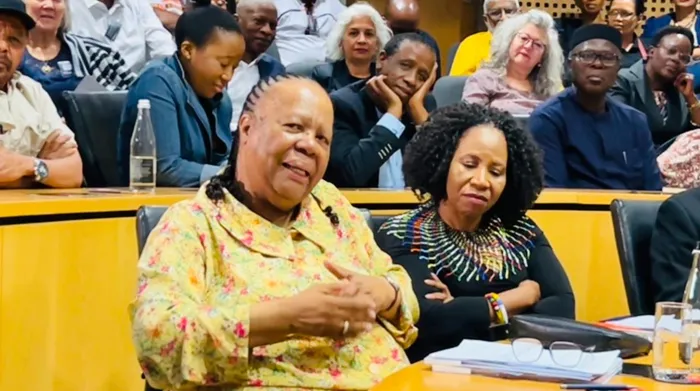
Dr Naledi Pandor at Mistra's annual lecture held at the University of Johannesburg on September 4, 2025. Visionary leadership with clarity of ideology is a must for Africa. Old notions of limited unity, failed projects, and inconsistency need to be replaced by vision, direction, and collaboration, says the writer.
Image: Thabo Makwakwa
Dr Naledi Pandor
M. Youssef Mahmoud and Albert Mbiatem (p2, 2021) begin their book on leadership and peace with a foreword by the Former President of Timor-Leste, President José Manuel Ramos-Horta.
He forthrightly states: “We are living in particularly challenging times. Liberal and social democracies are being overrun by intolerant far-right ideologies that embrace ethno-nationalism, xenophobia, racism, exclusion, and violence. These virulent ideologies thrive in many other parts of the world. They are dangerously undermining democracy and the rule of law, fundamental freedoms and human rights”.
That was published in 2021.
So where are we now?
Setting the context
The question everyone is seeking answers to relates to suspicion that a seismic global shift may be underway and that its true nature and purpose might remain opaque for some time.
Thus, those who are in the driving seat should prepare for a bumpy, uncertain, constantly shifting drive and be ready and nimble in changing gears.
Seasoned pundits and Public intellectuals are still attempting to theorise about the ‘landslide’ 2024 election win of President Trump. The curious musing and scrutiny arise from first-term missteps and mishaps. An arguably inadequate responsiveness to Covid-19, rejection of science in a leading research nation, increased antipathy toward diversity, and glaring neglect of the rule of law.
The broad poll expectation was that he would not perform well even if he won. How did the ground shift to a landslide degree for American voters, and how was this candidate the only option?
Has the ground shifted for the globe, has the world moved under our feet, while we were sleeping? When we ponder the moment, it is easy to forget that the signs were there in the first Trump term; the difference may be intensity and a newly energised, very robust intent on foreign policy and international trade disruption.
The answer to whether the world has shifted has to begin with scrutiny of the character and posture of the Biden administration up to 2024, especially its failure to sustain established Democratic Party confidence in international law, multilateral cooperation and reasonable trade terms with China or through the World Trade Organisation (WTO), and its inadequate response to a nervous public that latched on to the untruths of fake news and seemed to embrace the belief that America had lost its way.
Interestingly, “the way” as implied by the voting pattern, signalled a troubling departure from policy and practices traditionally associated with policy and practice in the United States.
Some examples include: a stance on immigration indicating the American dream was no longer an open invitation, and that an open, inclusive electoral democracy embraced for many decades was no longer regarded as legitimate; women’s reproductive rights and equality could be – and were - severely undermined, and judicial independence, a cornerstone of American democracy, was to suffer significant reversal.
The values and principles associated with established America had suddenly become the irritations of America, and their reversal became a threat to the rest of us.
So, the ground has shifted, and it is critical to recognise that tectonic shift and to adapt to it. The details of the missing way may not always be clearly articulated by Americans, but seem to lie somewhere between fear of immigration, a decline in working-class feelings of economic empowerment, blamed on migrants, and the view that government machinery has become a monstrous, menacing presence in public life.
Added to the then-increasing sense of an ‘American dilemma‘ is the continuing rise of China as an industrial manufacturing giant, a confident political global leader, and an increasingly innovative technology economy able to produce novel products and processes due to targeted investment in science, innovation, and technology.
Fifty years ago, Chinese universities did not feature significantly in scientific journals, and impressive numbers of Chinese students filled universities in Europe and America. That has changed, with millions attending university in China amidst a growing research profile.
The recent world war commemoration in China has surely added to the consternation. Attendance at the war commemoration is perhaps one of the most significant signs that ‘world shifting‘ is underway.
Furthermore, India has also grown in economic prowess and smartly built a niche in digital technology skills, surgical medicine, and management of tropical diseases. Efforts by China and India to combat poverty and create a thriving middle class have created a consumer client base that is more than five times that of America, and the two countries thus form a formidable economic force individually and together.
Both countries have smartly entered the creative arts and invested in fashion, film, culinary excellence, and music, astutely asserting that cultural power and political impact can merge gracefully.
East Asia has also become a powerful economic hub for tourism, manufacturing, and energy resources. Boasting large populations, Indonesia, the Philippines, Malaysia, Singapore, and Thailand have the capability to wield significant influence on global affairs, yet seem largely distant from current geopolitical tensions.
One matter that flares up and involves them in the geopolitical sparring between China and America is the issue of control of the South China Sea and, at times, tariffs - though that is tenuous in that region.
In the Pacific Rim, Japan and South Korea are economic and political heavyweights, and while largely stable, face the ‘menacing’ presence of North Korea. Japan has a global agenda primarily tied to the USA and has had to work at improving trade links with an increasingly capable China. Perhaps the ground beneath their feet shifted, too.
The recent South Korean decision to purchase 103 Boeing planes announced by President Lee at the White House (Economist Magazine, September 2, 2025) may indicate how South Korea plans to manage the shifting ground.
This means that, for the first time in centuries, America and Europe (the West) have effective non-European competitors that understand strategic imperatives and utilize opportunities effectively. It is difficult to describe Europe’s place in this competitive context.
The region continues to be a powerful global unit, but over time, it has somewhat appeared to lose currency due to a seeming deference to America.
While being one of the most established in institutional formation and most wealthy regional blocks, excessive bureaucracy, inadequate innovation, and attachment to traditional notions of the state have profiled Europe as uninventive, rather traditional, and focused largely on its own interests rather than global progress.
In his article on US and EU company formation in the growing digital market, Marcus Magarian (2024, 1) succinctly compares digital innovation and capacity in the USA and in Europe. He reports that “no EU company founded in the past 50 years has a market capitalisation exceeding 100 billion Euros, while all six US companies valued above a trillion dollars were created during this period.”
A telling fault line for Europe may lie in too dedicated a focus on internal policy, on regulation as protection, on agricultural subsidies and issues such as public service pension and thus failures to promptly recognise and respond to looming threats and desires for greater freedoms such as those growing in the Sahel or the need to 5 devise new approaches to the long standing tensions with the Russian Federation.
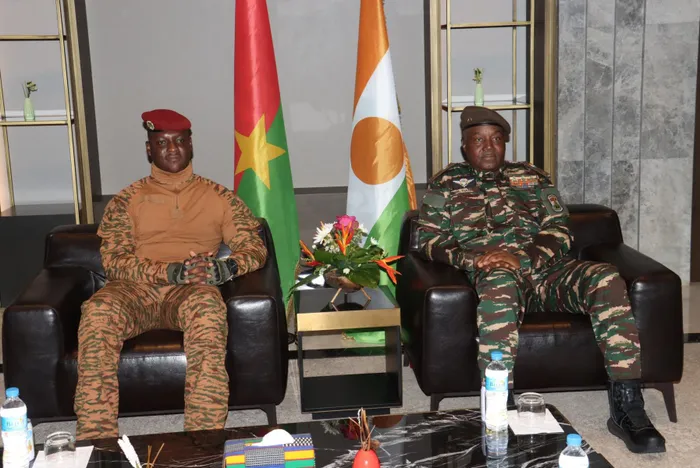
Burkina Faso's Captain Ibrahim Traore (left) and Niger's General Abdourahamane Tiani at the Alliance of Sahel States (AES) summit held in Niamey, Niger on July 5, 2024.
Image: AFP
What place does Africa occupy in these shifting grounds?
It has significant strategic potential and unrealised promise in lead economies such as Nigeria, South Africa, Ghana, Kenya, Egypt, Algeria, and Mauritius.
Nonetheless, our continent has yet to make good out of its abundant promise and to learn to do so as a strategic united economic force, rather than national states trying ineffectively to engage with giants. Tragically, Africa has not succeeded fully in weaning itself of dependency on Aid, on the reality of long-term leaders that cannot shift the ground, on corruption, and poor capacity in executing development plans.
Africa appears locked into existing positions while the ground is shifting. The belief that rescue exists from Europe, America, or China is misplaced, and greater investment in African excellence and African performance is critically urgent.
The demographic dividend of millions of young Africans is being wasted as the skills and education systems have not been able to offer young people quality education and skills that can contribute to economic growth or investment to support entrepreneurship.
Weak client states have rendered public service that is incompetent, arrogant, and crooked. The result is that needy people, seeking only a change in their lives, are turning to attitudes and practices that devalue democracy and reencourage attraction to a strong man who will produce results.
This is evident from the responses to the multiple coups in the past four years and the popularity of former senior military officials who don the cloak of head of state and self-proclaimed revolutionaries. Countries experiencing these political changes are desperately hanging on to the hope that this time things will be different.
Africa has been acknowledged as a very wealthy continent with vast mineral resources, abundant arable land, and a keen and enterprising youth.
Yet, it has the poorest people in the globe, the least literate, and very few with disposable assets. In the past two decades, internecine 6 conflicts, civil war, and rebel incursions have severely impacted Africa’s prospects.
Even more worrying, the imprint of illogical and angry extremism has entered Africa under the guise of the prejudice of Islamophobia. The conflicting groupings all emanate from generally poor backgrounds, yet they have the military means to exact a terrible toll on infrastructure and innocent civilians.
Practices alien to Africans, such as public beheadings, bombings, and the rape of women and girls, have been part of the expansion in African conflicts.
During the 1990s, several African countries illustrated Africa’s ability to achieve growth and progress. That period of prosperity through infrastructure development and investment in agriculture needs to be revived today, alongside increased support for ocean economies, increased energy resources, water infrastructure, and a plan for African management and pricing of its minerals.
The reflections on the African context are purposely lengthy due largely to the well-developed practice implying that the faults in Africa emanate from elsewhere and Africans do not have any responsibility for their condition.
This is patently false, as is illustrated by a string of self-inflicted failures. Failure to act on the plethora of development plans agreed under the auspices of the OAU and even today failing to vigorously implement Agenda 2063, the blueprint for the Africa we want.
The reality of external negative and friendly interference in Africa’s affairs is acknowledged, but the notion of complete African innocence for its dilemmas is patently false.
Ideological drivers of change
If it is plausible that the world has shifted, it is useful to consider the ideological underpinning of this change.
Is this an advance in progressive values and ambitions, or is it a regression? What of the left or the right today? The ideological influences that are impacting on nations, organisations, and regional blocs today are difficult to neatly compartmentalise.
Do we continue to have the clear divide of left, centre, and right? Or are the lines increasingly blurred?
In the period following the Second World War, the ideological cleavages and attachments seemed clearly delineated. The right wing and the centre existed in parts of the West and Latin America, the left wing in Eastern Europe, parts of the Caribbean, Asia, and Eurasia under the Communist ideology best expressed by the Soviet Union and China. Conservative ideology was associated with the then-declining National Socialism in Western Europe and the defeat of the Nazi regime, which somewhat drove right-wing adherents underground.
Marius Ostrowski (2023) suggests that the divides, as we may have used them in the past, have undergone changes that have resulted in some difficulties in clearly describing the distinctions in these political leanings. Members of society who we may regard as very liberal can be the ones pushing the most virulent xenophobia; those seen as conservative or on the right may be the staunchest fighters for workers’ rights.
He argues that expanding and contracting these ideological labels is often part of the “bread and butter of ideological contestation”.
We see this to some degree in this country, with those proclaiming white genocide and an end to land redistribution cast as revolutionary, while those supporting transformation are portrayed as behind the times.
The ideals of the Left served as an important resource for the struggle against colonialism in Africa and other regions of the world.
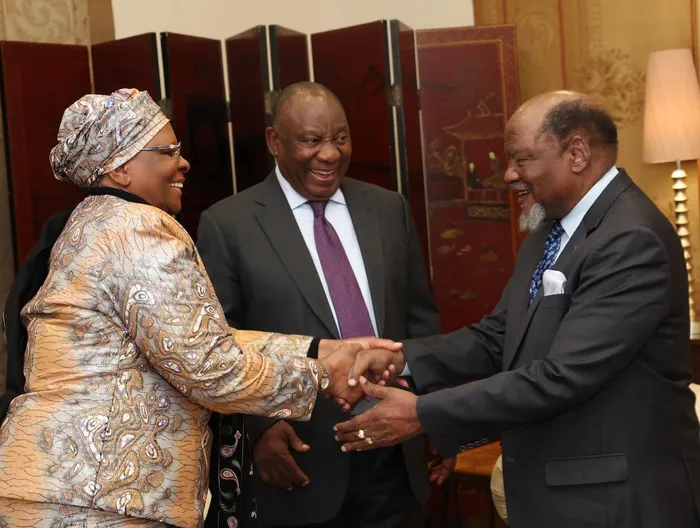
(From left) Swapo president Nutembo Nandi-Ndaitwah, ANC president Cyril Ramaphosa and former Frelimo president Joaquim Chissano at a working dinner held at Mahlamba Ndlopfu, Pretoria on July 26, 2025. The ANC hosted a Liberation Movements Summit in Ekurhuleni, Gauteng on July 25-27, 2025.
Image: GCIS
The South African liberation movements benefited from significant support from the left in the struggle with links to the Soviet Union and Russia in particular.
However, it is also possible to argue that individuals with vastly different political leanings played important roles in our liberation through civil society organisations that formed the heart of the international antiapartheid movement.
Globally, there is increased use of the label ‘Right’ at present in the face of the MAGA (Make America Great Again) movement, and following right-leaning party successes in Germany, in the United Kingdom local elections, in France’s local and assembly elections, and in Argentina’s swing to the right.
The left is sometimes described as ascendant in parts of Latin America, especially Brazil, Chile, and Colombia. The right tends to be ascribed hostility to immigration, as well as xenophobic, homophobic, pro-Israel beliefs, and austerity economics. Although the Labour Party in the UK has some of these features, it would probably strongly resist being described as right-wing.
The best approach may be to gauge political party policies on workers’ rights, equity, race, immigration, human rights, and international law.
I would argue that the left has been in decline for a long period, unable to rescue itself from suggestions of being weak on economic growth, soft on human rights, and insufficiently attentive to domestic interests and concerns.
The Right benefits from an assumed imagery of toughness, while the Left is often unable to challenge being depicted as weak. South Africa and those African countries that allow political parties are witnesses to the emergence of an increased ideological distinctiveness among political parties.
Some are rabidly anti migrants, or anti-African foreigners; some are firmly against black economic empowerment, and others are strongly supportive of state intervention in the economy. The oddity is that within those that support various forms of empowerment, ethnic chauvinism enjoys a lofty position, as does homophobia.
This makes it difficult to argue that the Left is strictly so and the Right is clearly such. I am uncertain as to the nature of political discussion in various parties as distinct from the desire to be elected to Parliament. The suspicion is that an agenda item on ‘Left or Right’ might be interpreted as marching orders rather than political discourse.
Ideologies have certainly shifted along with this shifting world.
Thus, while the Trump policies may, for our purposes, suit a ‘Right’ leaning compartment, the determination to have the state share ownership of defence companies, local production, and protectionist tariffs may be presumed more left.
The strong signal from Beijing this week of a seismic reordering does not directly provide ideological insights, apart from a clarity that direct engagement on a new world order is on the cards. The lack of ideological clarity sometimes poses potent threats and is particularly deadly for the pursuit of a human rights-oriented policy approach.
The tolerance of many of Israel’s allies for the genocide in Gaza indicates the obfuscation that can arise when there is significant dilution of political ideology.
Consider, for a moment, the development of international law after the Second World War.
The immediate post-war period was characterised by the emergence of political beliefs that appeared to promote a more humane and tolerant global community.
The United Nations was created as the premier world multilateral institution; this initiated the opportunity to develop a system of international law that would guide access to human rights, international cooperation, and the protection of civilians from the devastating effects of war.
That hopeful period gave life to the Universal Declaration on Human Rights, the Convention on Genocide, and other instruments and institutions designed to protect the innocent and the vulnerable. Human rights law and International humanitarian law were all codified in this period to form a body of protection against future wars.
A flaw, then, that influences and shapes global cooperation today, was the modelling of the UN Security Council (UNSC) based on victor, vanquished, and protector.
The five states that allocated the UNSC veto power to themselves created an unrepresentative and undemocratic practice that has hampered UN efforts to play the role of a trusted arbiter in world affairs. So, while the ground shifted then, it merely exaggerated and affirmed existing power structures.
Nonetheless, this was and has been a historic advance for the globe. The collapse of the Soviet Union and the creation of European states keen to break ties with the Soviet Union dealt a severe blow to the ideology of the Left. It also created ideological confusion for countries that had strong ties with the USSR and had relied on it to support liberation struggles and the end of colonial domination.
The Right morphed into presumed liberal ideology, a break from the colonial imperial presence and a more nuanced relationship of donor and exploiter of mineral resources. For citizens in Europe, life assumed a drive for resource accumulation, shift work that paid the bills, and a very slim hope of a full escape from the challenge of a mediocre existence.
The UK Conservative Party’s assault on trade union rights in the 1970s severely diminished the role of trade unions and converted many to pliant supplicants who exerted minimal influence on remnants of progressive thought and seemed to desert progressive ambitions on worker rights, respect for diversity, and the rejection of racism and exploitative economic policy.
That shift has had a lengthy growth period and is maturing today, as we see in trade union tolerance of human rights abuses. The decline of the left and the rise of the right collided with the impact of the attack on Iraq and the ensuing rise in Islamophobia linked to Zionism.
A significant component of international relations is framed by this recent yet ancient history.
It consists of a toxic and drugging mix of conflict of religions and civilisations, racist notions of superiority, and that enduring belief that difference means challenge. The failure to see offence in Gaza, as contrasted with perspectives on Ukraine, pointedly emphasises how human beings are defined as less worthy depending on race, geography, faith, and gender.
The shift has permitted currency and energy for several decades; morality and humane norms have been surrendered to the holders of the purse.
Developing countries and the poorest are the main losers in this declining ideological present, with billionaires and multinationals occupying supreme power to direct global affairs. This dismal assessment should not be read to suggest ideology doesn’t matter.
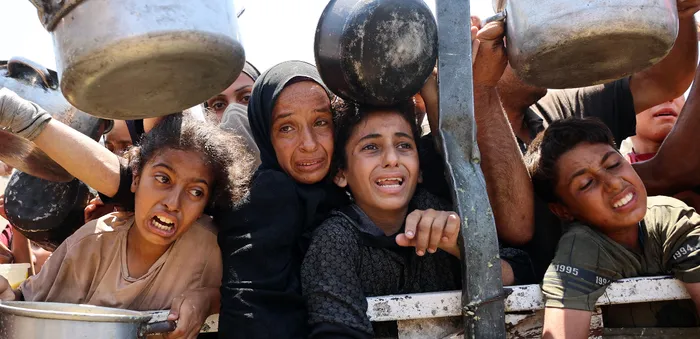
Palestinians receive lentil soup at a food distribution point in Gaza City. The World Health Organization warned that malnutrition was reaching "alarming levels" in Gaza.
Image: Omar AL-QATTAA / AFP
An urgent reinsertion of positive values and principles is vitally needed. Nelson Mandela recalled Senator John Lewis in the famous troublemaker speech, in which Lewis stated the world needs troublemakers who make good trouble.
In deference to that important call, the Nelson Mandela Foundation has adopted the ‘Making good trouble’ theme as part of its legacy work. Restoring progressive values is what foundations making good trouble need to work on today.
Imagine for a moment how easy it is for rights to dissipate. Research, innovation, and higher education thrive in a context that prizes and honours freedom of expression. Civil society and youth support for the Palestinian cause have witnessed a massive attack on freedom of expression and academic freedom.
The practice of telling universities what to teach and think, which essentially disappeared under Henry the Eighth, has found new life in Europe and America, with universities, research institutes, and even media caving in under state pressure.
Nothing has evidenced the sad diminution of progressive thought more than this collapse, which forced academics into being the implementers of actions they would have died before implementing twenty years ago.
Complacency and spaces for authoritarian directives
These failings result from the complacency that stems from early successes in the enjoyment of civil and political rights and in a belief that governance is benign.
The idea that thousands of workers could be dismissed from government employment in weeks would possibly be regarded as wild imagination here: it took less than two months in the USA, with not much of a whimper from trade unions and other organs of civil society.
Retaining energetic connections with democratic political processes is something we in South Africa should not neglect. Our history of mass mobilisation and participation has created a healthy political activism, but it is vital to strengthen and retain this with broad civic education and civic activism.
Authoritarian conduct has fascinating snowball characteristics. Negative actions may begin with instructions to end protests, and then change into curricula written by a politician, and then instruction on who to admit, and finally state control of all Senate appointments.
In the research domain, views of non-scientists on the efficacy of vaccines can develop into new protocols on infant inoculations, then become false statistics on infection prevalence, deaths, and so on.
A culture of rejecting intellectual excellence can very readily become a universal culture of mediocrity. The crowning of a big man who offers office positions, money, and undeserved clout can result from the laziness of complacency. This is the political embrace of “The Emperor’s Clothes” myth.
South Africa has a very good Constitution that attempts to address vast areas of socio-economic, civil, and political belonging. Critics sometimes complain about judicial independence - hoping, I assume, to have biddable judges who will ignore the law.
This is not to suggest the document is perfect, but, compared to many, I prefer it.
Others suggest radical amendments, including land redistribution. The Constitution provides for this, but action has been very lamentable.
A further demand is Parliamentary supremacy, not clear as to meaning, but we had that 13 under the apartheid Parliament with no checks and balances. Complacency must also be avoided by non-state actors.
The notion that citizens do not have social agency is patronising and a recipe for very slow progress in development. Citizens in countries straining under the weight of authoritarian democracy probably became complacent and assume that their rights will always be upheld by those chosen to govern. Public political expression should articulate preferred policies, rights, and practices.
The rudderless leadership effect
The speedily evolving context described extensively here requires focused, committed, knowledgeable, and visionary leadership. Leaders whose intention is to maintain stability due to fear of disruption are sure to fail their nations.
Leaders today have to be clear on purpose and goals. For all the faults ascribed to the leader of America, he has a clear purpose and vision: to make America great again by punishing other states, by using military and economic might, and by somehow convincing the working-class majority that every reversal is temporary and is in their interests and will eventually guarantee greatness.
Tragically, many will experience the results of failing to use power for positive objectives too late for recovery. In our context, making Africa great for the first time in centuries should be the key goal of our leaders. There is sometimes concern that the preferred targets in Africa remain hazy and unclear.
Small weak states compete unendingly and fail to collaborate on shared prosperity. Many African analysts comment that African economies are small and not likely to reach levels of growth to sustain their development plans. Yet, our countries appear to plan individually and thus fail individually.
Visionary leadership with clarity of ideology is a must for Africa. Old notions of limited unity, failed projects, and inconsistency need to be replaced by vision, direction, and collaboration. Africa is confronting bullying demands for its critical minerals; it’s unclear as to whether an African response and plan on these strategic resources has been agreed upon, or whether implementation is underway.
The imposition of unwieldy tariffs on African goods has probably been responded to without an African strategy. It is possible that far more is being done; if that is the case, improved communication will be most welcome.
If there is no collaborative response, it may be better not to know. However, it must be stressed that battling powerful bullies requires full engagement and collective action. Africa needs to recognise and acknowledge its strategic power and use it to good effect.
At present, we still act as supplicants; we have much to offer and should let the world know that. Much should be made of BRICS creating its own bank, and we should build on that foundation to establish international financing diversity. Focussed leadership should know what to do.
The intervention of a digital world
Digital technology has become a significant and potent political and knowledge force. The development of artificial intelligence is creating a larger gap between the rich and the poor.
Added to that, social media and AI tools can contribute to political confusion and the promotion of lies as truth. There is a real danger that the shifting sands of technology -while being a great advance- can serve as the purveyor of ignorance and the absence of intellectual rigour.
Our societies need to be nimbler in responding effectively to dishonesty via social media and the use of hatred and misogyny to create followers and influence.
South Africa has been a victim of these false claims in the current white genocide claims promoted by organisations and individuals in our country. The surprise has been the lack of informed debate and fact-checking on this matter. Individuals, using imagery and technology to lie, have escaped scrutiny and effectively evade probing questions.
Interestingly, the response of some laudable opinion writers in our country has been to call on the government and the ANC to respect America, given its economic weight and influence. No such calls for respect for Africa were ever made when Africa was called a dirty name.
The world shifting should not mean we collapse in that momentum; we need to strengthen the grip of our feet and find our centre. This inflection point is a moment in which Africa could be so much more, and we should use it to strengthen multipolarity cooperation and the creation of a better world.
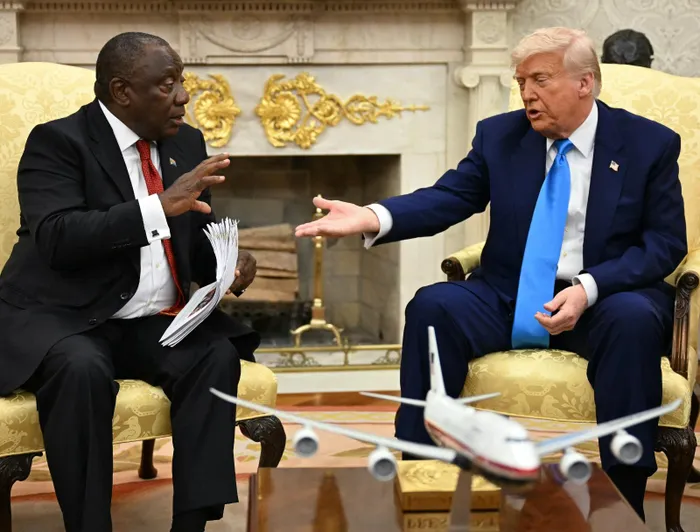
US President Donald Trump hands papers with news clippings of alleged farm murders to President Cyril Ramaphosa during a meeting in the Oval Office of the White House in Washington.
Image: AFP
Relations between the USA and South Africa
It is important to reiterate that South Africa intends to retain good relations with America while also strengthening relations with other countries. South Africa has benefited from the presence of hundreds of American companies employing thousands.
In the automotive sector, South African workers have developed excellent skills and can be utilised to build competence in other technology sectors.
South Africa needs to build relations based on mutual interests rather than unequal partners. Our interventions and responses should acknowledge the importance of newer and growing trading partners, such as our continent, East Asia, and China.
President Ramaphosa has been emphatic about continuing to rebuild solid relations with America while also being diverse and complementary in approaches to existing and new opportunities.
The G20 moment
The Chairship of G20 has created excellent opportunities for South Africa to showcase our country and the continent. The South African theme unashamedly confirms our commitment to positive values of diversity and shared prosperity.
The efficient hosting of over 100 meetings has illustrated our ability to manage large events and created a fresh opportunity in this climate to strengthen links with Europe and the world’s premier emerging economies.
South Africa needs to use the summit to have a dedicated reflection on the globe, on international law, inclusive growth, and strategies to relieve Africa of the yawning post-COVID debt that is hindering Africa’s progress. If a new alliance on humane values can be built among the nineteen that may attend, the prospects for this changing world will be more positive, and it will be wonderful that South Africa will have played a new leadership role in establishing a new global ethos.
References
Marcus Magarian. 2024. ‘’The Great Divide: Comparing U.S. and EU Companies Founded in the Last 50 Years with $10B+ Valuations’’. Available online at https://www.linkedin.com/pulse/great-dividecomparing-us-eu-companies-founded-last-50-magarian-gcuae/
Marius S. Ostrowski. 2023. ‘’The ideological morphology of left-center-right’’. Journal of Political Ideologies 28(1). Available online at https://www.researchgate.net/publication/367321117_The_ideological_m orphology_of_left-centre-right.
Youssef Mahmoud with Albert Mbiatem. 2021. ‘’Whose Peace Are We Building? Leadership for Peace in Africa’’. London. I.B.Taurius.
* Dr. Naledi Pandor is Chairperson of the Nelson Mandela Foundation and South Africa's former Minister of International Relations and Cooperation. This is an edited version of her Annual Lecture at the Mapungubwe Institute for Strategic Research (MISTRA) on September 4, 2025, University of Johannesburg.
** The views expressed do not necessarily reflect the views of IOL, Independent Media or The African.